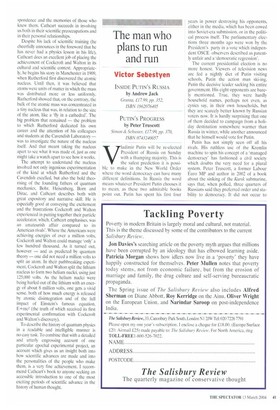The man who plans to run and run
Victor Sebestyen
INSIDE PUTIN'S RUSSIA by Andrew Jack Granta, £17.99, pp. 352, ISBN 1862076405 PUTIN'S PROGRESS by Peter Truscott Simon & Schuster, £17.99, pp. 370, ISBN 0743240057 Vladimir Putin will be re-elected President of Russia on Sunday with a thumping majority. This is the safest prediction it is possible to make in the New World Order where the word democracy can have many different definitions. In Russia the word means whatever President Putin chooses it to mean, as these two admirable books point out. Putin has spent his first four
years in power destroying his opponents, either in the media, which has been cowed into Soviet-era submission, or in the political process itself. The parliamentary elections three months ago were won by the President's party in a vote which independent OSCE observers described as patently unfair and a 'democratic regression'.
The current presidential election is no more honest. Viewers of television news are fed a nightly diet of Putin visiting schools, Putin the action man ski-ing, Putin the decisive leader sacking his entire government. His eight opponents are barely mentioned. True, they were hardly household names, perhaps not even, as cynics say, in their own households, but they are scarcely better known by Russian voters now. It is hardly surprising that one of them decided to campaign from a holiday destination somewhere warmer than Russia in winter, while another announced that he himself would vote for Putin.
Putin has not simply seen off all his rivals. His ruthless use of the Kremlin machine to spin his concept of a 'managed democracy' has fashioned a civil society which doubts the very need for a plural system. Peter Truscott, a former Labour Euro MP and author in 2002 of a book about the sinking of the Kursk submarine, says that, when polled, three quarters of Russians said they preferred order and stability to democracy. It did not occur to
them that perhaps they could have both. Andrew Jack, the Financial Times's excellent correspondent in Moscow, is more sanguine about the state of Russia. Nevertheless he fills his book with chilling examples of the authoritarian nature of the country's president.
Both authors are agreed that the key fact of Putin's life is that he volunteered to join the KGB at the age of 17. After taking a law degree, he spent 15 years working for 'the organs', as they are still known in Russia, happily and loyally until the collapse of communism. 'For better or worse, I was never a dissident,' Putin said once. His hero remains the Soviet spymaster, and, briefly, the communist leader, Yuri Andropov, to whom Putin has dedicated a plaque in the Lubyanka. Though he broke into national politics only in 1996. Putin's rise up the Kremlin ladder was meteoric. He was handpicked by Boris Yeltsin as his successor in 1999 on the understanding that he would protect The Family — Yeltsin's relatives and associates who made fortunes out of dubious business dealings. Putin kept his side of the bargain. The power of incumbency helped Putin win a landslide victory on his own account. Quickly, the 'nobody from nowhere' showed he had a mind of his own. He has some good qualities, as Andrew Jack lists: nobody has seriously suggested that Putin is personally corrupt. Also, he has nerve. Putin would claim as one of his triumphs his war with the so-called oligarchs, the small number of businessmen who between them own a third of Russia's economy.
One has to be careful what one says about these men, some of whom live in luxurious exile in Britain and own Premiership football clubs. They became unimaginably rich in the Yeltsin era, billionaires almost overnight in ways that even the robber barons in 19th-century America might have found dodgy. Jack shows in fascinating detail how they came by their wealth, including a simple layman's explanation for the shameless 'loans for shares' scheme. Under this, the government loaned favoured businessmen money with which they bought prime state assets such as oilfields for a fraction of their worth. Putin says that he had to challenge the oligarchs' power in order to make Russian capitalism more 'normal', meaning of a type that Adam Smith would recognise. That sounds plausible. The problem is that he picked fights selectively, only with those who owned media interests that were critical of him or who funded opposition politicians. Compliant oligarchs are safe under Putin.
Both authors claim that Putin has a good sense of humour, though they produce no examples. His comment after the Kursk disaster hardly counts. At a press conference, the President was asked what happened to the submarine. 'It sank,' he replied with a giggle. This might pass for a joke in KGB circles, but probably nowhere else. Putin seldom becomes emotional except, records Andrew Jack, when the subject is Chechnya, where he is convinced that he is taking part in the global war on terrorism. George Bush and Tony Blair may come to regret having tacitly agreed with him and accepted that bombing Grozny into rubble is a fair and reasonable tactic in the struggle.
Putin is given credit for some halting but significant improvements to the Russian economy after 1998 when she defaulted on her debts. But at what price? Truscott reports worrying conversations with Kremlin aides who, even before Putin has won his second term, are floating the idea of changing the constitution to allow the President to stand more than twice. Truscott is convinced Putin, still only 52, aims to go on and on. We have been warned.



































































 Previous page
Previous page